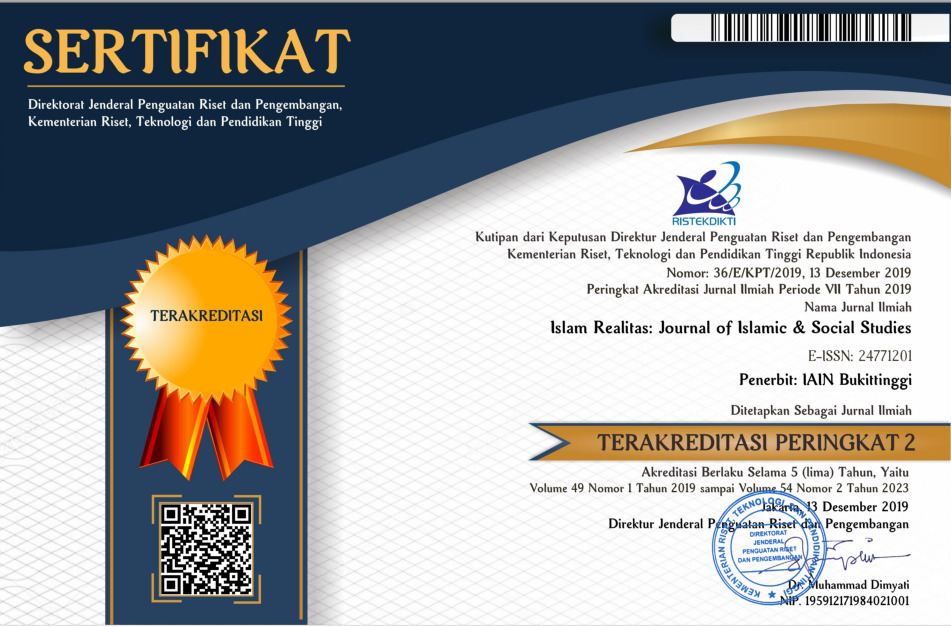Hubungan Rasa Kebersyukuran dengan Adversity Quotient pada Mahasiswa Penerima Beasiswa BIDIKMISI UIN Imam Bonjol
DOI:
https://doi.org/10.30983/fuaduna.v3i1.2345Abstract
This research aimed to find out the level of gratification, the level of adversity quotient, and the relationship of gratitude with adversity quotient in UIN Imam Bonjol Padang BIDIKMISI recipient students. This research uses quantitative methods with data analysis techniques namely Pearson correlation analysis which the SPSS program version 20.0 for windows. The independent variable in this study is gratification and the dependent variable is the adversity quotient. Research subjects numbered 229 students receiving the bidikmisi UIN Imam Bonjol Padang. Data collection techniques used in this study are psychological scales, namely the scale of gratitude that the authors arrange themselves with a validity of 48 out of 60 items and have a reliability of 0,934 and an adversity quotient scale that the authors compose themselves with a validity of 50 out of 59 items and a reliability of 0,921. Based on the results of the analysis of research data shows the Pearson Correlation coefficient of 0,501 with a significance of 0,000 (0,000 < 0,05), so that it can be concluded that there is a significant relationship between gratification with adversity quotient in students receiving Bidikmisi State Islamic University (UIN) Imam Bonjol Padang. These results also indicate that bidikmisi recipient students have average scores of high gratification rates and moderate dominant adversity quotient levels.
References
Arif, Iman Setiadi. 2016. Psikologi Positif : Pendekatan Saintifik Menuju Kebahagian. Jakarta : PT Gramedia Pustaka Utama
Amin, Samsul Munir. 2016. Ilmu Akhlak. Jakarta : Amzah
Arikunto, Suharsimi. 2010. Prosedur Penelitian. Yogyakarta : Rineka Cipta
Azwar, Saifuddin. 2012. Penyusunan Skala Psikologi. Yogyakarta : Pustaka Belajar
Departemen Agama RI. 2017. Al-Qur’an dan Terjemahan. Jakarta : Cahaya Press
Dhea, Eka. 2016. Tingkat stres akademik pada mahasiswa bidikmisi dan non bidikmisi FIP UNY. Jurnal Riset Vol.5 No.12. Yogyakarta : UNY
Farid, Ahmad. 2016. Zuhud dan Kelembutan Hati. Depok : Pustaka Khazanah Fawa’id
Ghazali. 2013. Ihya Ulumuddin: Menghidupkan Kembali Ilmu-ilmu Agama. Jakarta: Republika
. 2014. Mukhtashar Ihya Ulumuddin. Depok : Keira Publishing
Gulen, Muhammad Fethullah. 2013. Tasawuf Untuk Kita Semua. Jakarta : Republika
Gumilar & Qurotul Uyun. 2009. Kebersyukuran dan Kebermaknaan Hidup pada Mahasiswa. Jurnal Psikologika Volum 13 No 1. Yogyakarta : Universitas Islam Indonesia
Mahfud, Choirul. 2014. The Power Of Syukur. Jurnal Vol.9 No.2. Surabaya : Lembaga Kajian Agama dan Sosial.
Ma’mun, Mohamad Nuruddin. 2010. Kekuatan dan Nikmatnya Bersyukur. Jakarta: Belanoor
Musabiq, Lu’lu, Adila Sari, dan Hervi. 2018. Stres, Motivasi Berprestasi, Bersyukur, dan Perceived Social Support: Analisis Optimisme pada Mahasiswa Penerima Beasiswa Bidikmisi. Jurnal Vol. 4 No. 1. Depok : Universitas Indonesia.
Octavia, Efi. 2013. Hubungan Antara Adversity Quotient dan Work-Study Conflict pada Mahasiswa yang Bekerja. Jurnal Vol.1 No.1. Yogyakarta: Universitas
Islam Indonesia.
Priyatno, Duwi. 2011. Buku Saku Analisis Statistik Data SPSS. Yogyakarta: MediaKom
Rusdi, Ahmad. 2016. Syukur dalam Psikologi Islam dan Konstruksi Alat Ukurnya. Jurnal Vol.2 No.2. Yogyakarta: Universitas Islam Indonesia
Sangadji, E.M. & Sopiah., (2010). Metodologi Penelitian Pendekatan Praktis dalam Penelitian. Yogyakarta: Andi.
Sapuri, Rafy. 2017. Psikologi Islam : Tuntutan Jiwa Manusia Modern. Jakarta : Rajawali Pers
Shaughnessy, Jhon., dkk. 2012. Metode Penelitian dalam Psikologi (Research Methods in Psychology). Jakarta : Salemba Humanika
Stewart, Charles J. 2012. Interviu: Prinsip dan Praktik. Jakarta: Salemba Humanika
Stoltz, Paul G. 2005. Adversity Quotient : Faktor Paling Penting dalam Meraih Sukses. Jakarta : PT Gramedia
Sugiyono. 2010. Metode Penelitian Kuantitatif, Kualitatif, dan R & D. Bandung : Alfabeta
Supardi. Tt. Pengaruh Adversity Quotient terhadap Prestasi Belajar Matematika. Jurnal Formatif 3(1). Jakarta Selatan : Universitas Indraprasta PGRI
Tim Penyusun. 2015. Pedoman Akademik, Pedoman Kemahasiswaan, dan Pedoman Penulisan Karya Ilmiah. Padang : IAIN IB Padang.
Ubaid, Ulya Ali. 2014. Sabar dan Syukur: Gerbang Kebahagiaan di Dunia dan Akhirat. Jakarta: Amzah.
Utami, Isiya Bekti. 2007. Hubungan Antara Optimisme Dengan Adversity Quotient Pada Mahasiswa Program Studi Psikologi Fakultas Kedokteran Uns Yang Mengerjakan Skripsi. Jurnal. Surabaya : Universitas Sebelas Maret
Utami, Rizki Meita. 2016. Perbedaan Tingkat Kecerdasan Adversity Mahasiswa Bidikmisi dan Non Bidikmisi Fakultas Ilmu Pendidikan Universitas Negeri Yogyakarta. Jurnal. Yogyakarta : Universitas Negeri Yogyakarta
Yatimah, Nur. 2016. Hubungan Rasa Syukur dengan Regulasi Diri pada Mahasiswa Berprestasi Penerima Beasiswa Bidikmisi IAIN Tulungagung. Tulungagung : Skripsi Tidak diterbitkan, IAIN Tulungagung
Yoga, Miarti. 2016. Adversity Quotient: Agar Anak Tak Gampang Menyerah. Solo: Tinta Medina
Https://bidikmisi.belmawa.ristekdikti.go. id diakses pada Kamis, 1 November 2018 pukul 19.08 WIB
Https://lpminkams-feb.trunojoyo.ac.id diakses pada Sabtu, 3 November 2018 pukul 14.02 WIB.
Downloads
Published
How to Cite
Issue
Section
Citation Check
License
Authors who publish with this journal agree to the following terms:
- Authors retain copyright and grant the journal right of first publication with the work simultaneously licensed under a Creative Commons Attribution-ShareAlike 4.0. that allows others to share the work with an acknowledgment of the work's authorship and initial publication in this journal.
- Authors are able to enter into separate, additional contractual arrangements for the non-exclusive distribution of the journal's published version of the work (e.g., post it to an institutional repository or publish it in a book), with an acknowledgment of its initial publication in this journal.
- Authors are permitted and encouraged to post their work online (e.g., in institutional repositories or on their website) prior to and during the submission process, as it can lead to productive exchanges, as well as earlier and greater citation of published work (See The Effect of Open Access).





